Cognitive Penetrability and the Epistemic Role of Perception: Palgrave Innovations in Philosophy
Autor Athanassios Raftopoulosen Limba Engleză Hardback – 15 mar 2019
This book is about the interweaving between cognitive penetrability and the epistemic role of the two stages of perception, namely early and late vision, in justifying perceptual beliefs. It examines the impact of the epistemic role of perception in defining cognitive penetrability and the relation between the epistemic role of perceptual stages and the kinds (direct or indirect) of cognitive effects on perceptual processing.
The book presents the argument that early vision is cognitively impenetrable because neither is it affected directly by cognition, nor does cognition affect its epistemic role.
It also argues that late vision, even though it is cognitively penetrated and, thus, affected by concepts, is still a perceptual state that does not involve any discursive inferences and does not belong to the space of reasons. Finally, an account is given as to how cognitive states with symbolic content could affect perceptual states with iconic, analog content, during late vision.
Din seria Palgrave Innovations in Philosophy
-
 Preț: 386.81 lei
Preț: 386.81 lei -
 Preț: 396.40 lei
Preț: 396.40 lei -
 Preț: 387.75 lei
Preț: 387.75 lei - 15%
 Preț: 637.59 lei
Preț: 637.59 lei -
 Preț: 387.38 lei
Preț: 387.38 lei - 18%
 Preț: 730.16 lei
Preț: 730.16 lei - 15%
 Preț: 582.80 lei
Preț: 582.80 lei -
 Preț: 389.49 lei
Preț: 389.49 lei - 15%
 Preț: 700.29 lei
Preț: 700.29 lei - 15%
 Preț: 640.55 lei
Preț: 640.55 lei - 15%
 Preț: 647.40 lei
Preț: 647.40 lei - 18%
 Preț: 732.52 lei
Preț: 732.52 lei - 18%
 Preț: 894.46 lei
Preț: 894.46 lei - 18%
 Preț: 955.70 lei
Preț: 955.70 lei - 15%
 Preț: 499.26 lei
Preț: 499.26 lei -
 Preț: 386.22 lei
Preț: 386.22 lei
Preț: 534.50 lei
Preț vechi: 628.82 lei
-15% Nou
Puncte Express: 802
Preț estimativ în valută:
102.28€ • 107.00$ • 84.96£
102.28€ • 107.00$ • 84.96£
Carte tipărită la comandă
Livrare economică 03-17 aprilie
Preluare comenzi: 021 569.72.76
Specificații
ISBN-13: 9783030104443
ISBN-10: 3030104443
Pagini: 310
Ilustrații: XIX, 368 p. 2 illus.
Dimensiuni: 148 x 210 mm
Greutate: 0.61 kg
Ediția:1st ed. 2019
Editura: Springer International Publishing
Colecția Palgrave Macmillan
Seria Palgrave Innovations in Philosophy
Locul publicării:Cham, Switzerland
ISBN-10: 3030104443
Pagini: 310
Ilustrații: XIX, 368 p. 2 illus.
Dimensiuni: 148 x 210 mm
Greutate: 0.61 kg
Ediția:1st ed. 2019
Editura: Springer International Publishing
Colecția Palgrave Macmillan
Seria Palgrave Innovations in Philosophy
Locul publicării:Cham, Switzerland
Cuprins
Chapter 1- Cognitive Penetrability and the Epistemic Role of Perception.- Chapter 2- Cognitive Penetrability.- Chapter 3- Early Vision and Cognitive Penetrability.- Chapter 4- The Cognitive Effects on Early and Late Vision and their Epistemological Impact.- Chapter 5- Early and Late Vision: Their Processes and Epistemic Status.
Notă biografică
Athanassios Raftopoulos is Professor of Epistemology and Cognitive Science at the Department of Psychology, University of Cyprus, Cyprus.
He has been a fellow at the Center for Philosophy and History of science at Pittsburgh University, USA, and has published more than 130 papers and books in philosophy of science, philosophy of perception, philosophy of mind, cognitive psychology, and cognitive science.
Textul de pe ultima copertă
This book is about the interweaving between cognitive penetrability and the epistemic role of the two stages of perception, namely early and late vision, in justifying perceptual beliefs. It examines the impact of the epistemic role of perception in defining cognitive penetrability and the relation between the epistemic role of perceptual stages and the kinds (direct or indirect) of cognitive effects on perceptual processing.
The book presents the argument that early vision is cognitively impenetrable because neither is it affected directly by cognition, nor does cognition affect its epistemic role.
It also argues that late vision, even though it is cognitively penetrated and, thus, affected by concepts, is still a perceptual state that does not involve any discursive inferences and does not belong to the space of reasons. Finally, an account is given as to how cognitive states with symbolic content could affect perceptual stateswith iconic, analog content, during late vision.
Athanassios Raftopoulos is Professor of Epistemology and Cognitive Science at the Department of Psychology, University of Cyprus, Cyprus. He has been a fellow at the Center for Philosophy and History of science at Pittsburgh University, USA, and has published more than 130 papers and books in philosophy of science, philosophy of perception, philosophy of mind, cognitive psychology, and cognitive science.
Caracteristici
Divides and discusses visual perception in terms of 'early vision' and the often overlooked perceptual stage of 'late vision' Provides an account of how cognitive states could affect perceptual states in a way that entails late vision is cognitive penetrability Approaches problems using a unique perspective in which empirical studies and philosophical analysis are interwoven
